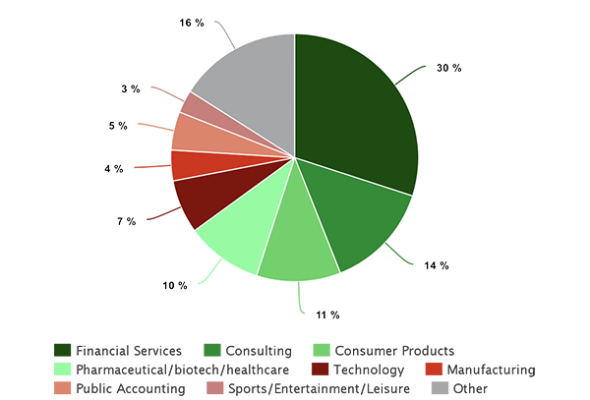RESTON, Va., June 20, 2017 (GLOBE NEWSWIRE) — Corporate hiring plans for 2017 point to robust employment opportunities for graduates of MBA and business master’s programs, according to a new employer survey report from the Graduate Management Admission Council (GMAC). Globally, 86 percent of companies plan to hire recent MBA graduates this year, up from 79 percent that hired them in 2016. Demand for these MBA graduates is strongest in the United States and Asia-Pacific, where 9 in 10 companies plan to hire these candidates.

Karen Heise
“It’s indeed good news the market continues to value MBA talent,” said Karen Heise, Director of Olin’s Weston Career Center. “The expectations and requirements for MBA students to achieve their career goals means a lot of hard work, persistence and resilience. Olin’s MBA students invest significantly in their career search and succeed across a wide range of industries (consulting, financial services, technology, CPG, manufacturing and healthcare being the front-runners) and job functions including finance, general management, consulting, and marketing. The entrepreneurial spirit of our students serves them well in capitalizing on opportunities where MBA talent is valued.”

“Despite the political uncertainty about the status of immigration and work visas in the United States and other parts of the world, companies are keen to hire graduates from this year’s MBA and business master’s programs, including international candidates,” said Sangeet Chowfla, GMAC president and CEO. “This signifies the value these programs create for students and the vital role their skill sets bring employers.”
At the time GMAC conducted the Corporate Recruiters Survey in early 2017, respondents in Asia-Pacific, Europe, Latin America and the United States declared their companies are staying the course with plans to hire international graduate business candidates. Overall, 59 percent of the survey respondents plan to hire or are willing to hire MBA and business master’s graduates requiring legal documentation — a gain of seven percentage points from 2016.
Most U.S. companies (55 percent) either plan to hire (28 percent) or are open to hiring (27 percent) an international candidate in 2017 — up from 49 percent that had such plans last year. The technology industry in the U.S. is the most likely to hire international business graduates this year. Half of U.S. tech firms (50 percent) plan to hire such candidates in 2017 — up from 27 percent that planned to hire them last year.
GMAC conducted the 16th annual Corporate Recruiters Survey in February and March 2017 together with survey partners EFMD and MBA Career Services & Employer Alliance (MBA CSEA), in association with 97 participating graduate business schools. Survey findings are based on responses from 959 employers representing more than 628 companies in 51 countries worldwide. Two additional organizations, CEMS and RelishMBA, assisted with recruitment of survey participants.
Additional Key Findings
Hiring Demand Also Bright for Business Master’s Graduates
As the outlook for MBA hiring continues to look bright, so do projected hiring trends for 2017 business master’s graduates, especially those with Master in Management and Master of Accounting degrees.
• The largest increase in hiring demand compared with 2016 is seen in the share of companies that plan to hire Master in Management graduates; globally, 59 percent plan to hire recent Master in Management graduates, up nine percentage points from last year.
• Notably, 70 percent of manufacturing companies plan to hire Master in Management graduates in 2017, up from 50 percent of companies that hired them in 2016.
• Data analytics expertise continues to be in high demand. Sixty-nine percent of employers plan to place recent graduate business school hires into data analytics roles in 2017, just trailing marketing, business development, and finance roles — each with 71 percent.
More Start-Up Companies Plan to Hire B-School Grads This Year
For the first time, this year’s survey report breaks out the responses specifically among start-up companies, revealing a promising 2017 hiring outlook for business school graduates. Three in 4 start-ups plan to hire recent MBA graduates in 2017, up from the 52 percent that hired them in 2016. More start-ups also plan to make 2017 hires from graduates of Master in Management (37 percent), Master of Accounting (23 percent), and Master of Finance (25 percent) programs.
Compensation: MBA Salaries Will Reflect 83 Percent Premium Over Recent Bachelor’s Salaries
Globally, more than half of survey respondents (52 percent) report that MBA base salaries will increase at (34 percent) or above (18 percent) the rate of inflation in 2017. Latin America (74 percent of respondents) and Asia-Pacific (59 percent) have the greatest share of companies that plan to increase MBA salaries either at or above the rate of inflation this year.
A majority of European and U.S. companies (57 percent and 51 percent, respectively) will maintain 2016 salary rates for new MBA hires in 2017. The projected median base starting salary for recent MBA graduates in the U.S. in 2017 is US$110,000, up from a median of US$105,000 in 2016. This represents an 83 percent premium over recent bachelor’s-degree holders in the U.S., who can expect to receive a median starting salary of US$60,000 in 2017.
“Once again, this year’s report brings to light the continued value of the MBA degree to the marketplace,” said Megan Hendricks, executive director of MBA CSEA. “The increased interest in specialty master’s talent provides further indication of the relevance of these programs at our member schools.”
Link to download the full report.
About GMAC: The Graduate Management Admission Council (GMAC) is a global, nonprofit association of 220 leading graduate business schools. Founded in 1953, we are actively committed to advancing the art and science of admissions by convening and representing the industry and offering best-in-class products and services for schools and students. GMAC owns and administers the Graduate Management Admission Test® (GMAT®) exam, used by more than 6,500 graduate programs worldwide, and the NMAT by GMAC™ exam, for entrance into graduate management programs in India.
Source: GMAC news release








 Reality: “While you certainly can get a job in St. Louis or the Midwest at Olin, the opportunities at the school are all over. We have students that are going to the East Coast, the West Coast and all over the world. Olin may be in St. Louis, but it opens doors to wherever you want to go.”
Reality: “While you certainly can get a job in St. Louis or the Midwest at Olin, the opportunities at the school are all over. We have students that are going to the East Coast, the West Coast and all over the world. Olin may be in St. Louis, but it opens doors to wherever you want to go.”


